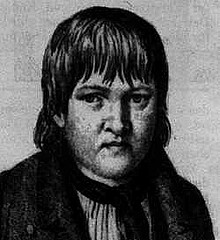
On May 26, 1828, a 16-year-old boy wandered into Nuremberg. He appeared to have the mental development of a 6-year-old; he could not say where he had come from, only repeating the sentence “I want to be a knight, as my father was” and the name “Kaspar Hauser.”
Two letters carried by the boy implied that his widowed mother had given him up to the care of a laborer, who had raised him in a secluded room. He said he had spent most of his life in a tiny cell with a straw bed, fed only on bread and water and occupied only with a carved wooden horse. Occasionally he was drugged so that his clothes could be changed and his hair cut. A mysterious man would visit him on occasion, always careful to hide his face.
It was noted that Hauser bore a passing resemblance to the grand duke of Baden. Officially the house of Baden had no comment about his case (it doesn’t to this day), but it seems someone was anxious to silence him: In 1829 a hooded man attacked him with an ax, succeeding only in wounding him slightly, and four years later another stranger waylaid and stabbed him. He died three days later.
Searching the crime scene, police found a small black purse with a note: “Hauser will be able to tell you how I look, where I came from and who I am. To spare him from this task I will tell you myself. I am from … on the Bavarian border … My name is MLO.”
Hauser lies now in a country graveyard. His headstone reads, “Here lies Kaspar Hauser, riddle of his time. His birth was unknown, his death mysterious.”
